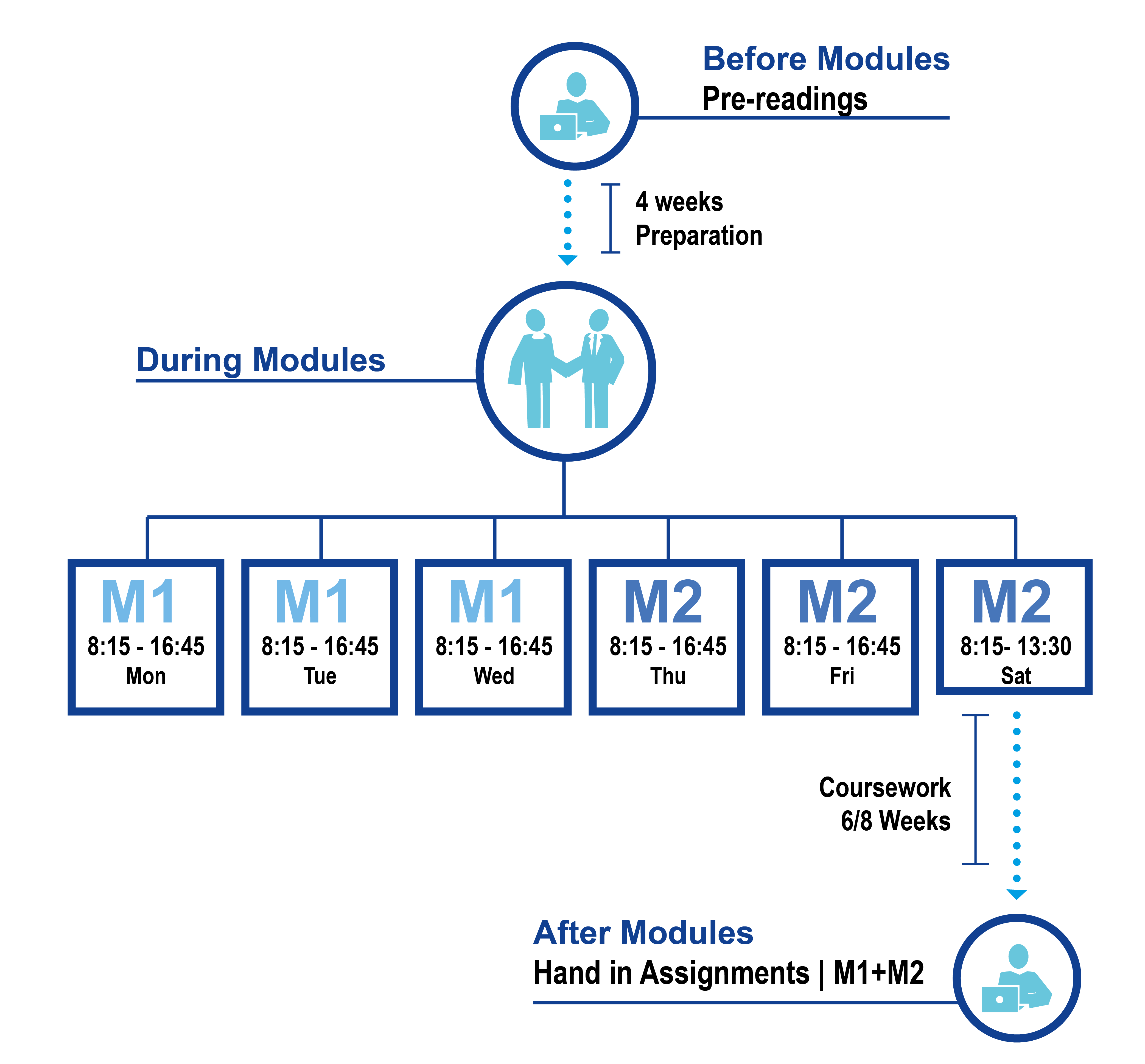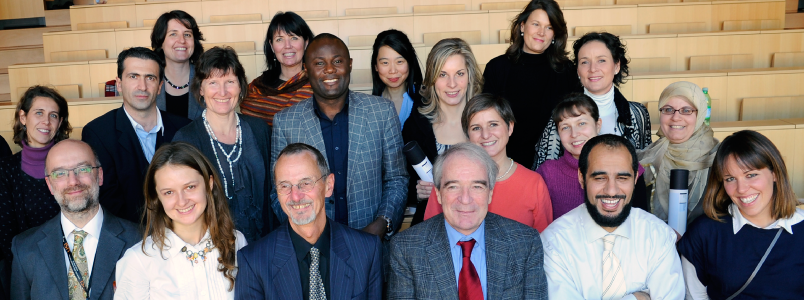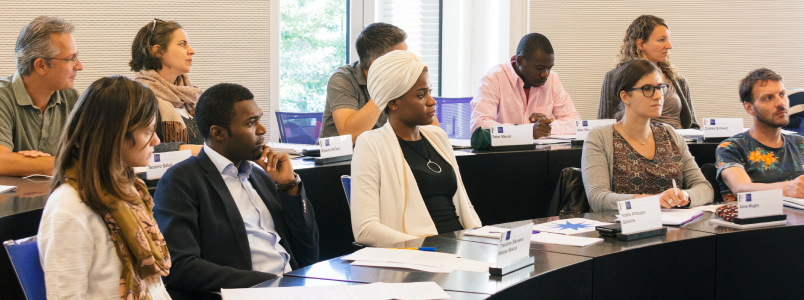OUR PROGRAMS ARE CURRENTLY SUSPENDED.
![]()
![]()
![]()
![]()
![]()
Master of Advanced Studies in Intercultural Communication
The most comprehensive program in intercultural communication for professionals working with diversity.
Distributed across 18 modules in 3 countries, the MAS comprises 8 weeks of study and 1 online module, plus a Thesis/Field Project.
PROGRAM STRUCTURE
Online module
The online module introduces the participants to the program and intercultural communication theoretical framework. Participants will learn key concepts for increased awareness of their own communication and cultural diversity as well as analyzing intercultural interactions in various contexts. The module involves virtual interactions with other participants and professors. The module also includes a course on visualization tools. Participants will learn about cross-cultural variations in the interpretation of visual communication and practical applications of visualizations communicating across cultures and for facilitating intercultural communication.
Face-to-face instruction
The main part of each module will be taught face-to-face over three days of intensive instruction for a total of 24 hours course work.
Preparation
The individual preparation for each module, to be done before classroom instruction, consists mainly of reading background materials and analyzing examples and case studies (articles, websites, etc.). All preparatory materials are available in advance on the e-learning platform reserved for participants.
Certification paper
The evaluation of students' performance for each module is based on an academic assignment. This work has to be prepared by the student at home and has to be sent by email by the deadline set by the Academic Director. Participants usually have about 2 months to complete their certification paper.


PROGRAM CONTENT
|
DATES and MODULES |
||
|
Online Module |
||
|---|---|---|
|
Available from September 2020 |
Interdisciplinary theories and concepts of Intercultural Communication |
|
|
November 2020 |
||
|
23-Mon | 25-Wed |
Lugano, Switzerland | |
|
26-Thu | 28-Sat |
Lugano, Switzerland | |
|
January 2021 |
||
|
18-Mon | 20-Wed |
Johannesburg, South Africa We will only travel if global health conditions allow. If not, the module will be held in Lugano. |
|
|
21-Thu | 23-Sat |
Johannesburg, South Africa We will only travel if global health conditions allow. If not, the module will be held in Lugano. |
|
|
March 2021 |
||
|
22-Mon | 24-Wed |
Neuchâtel and Bern, Switzerland | |
|
25-Thu | 27-Sat |
Neuchâtel and Geneva, Switzerland | |
|
June 2021 |
||
|
21-Mon | 23-Wed |
Lugano, Switzerland | |
|
24-Thu | 26-Sat |
Lugano, Switzerland | |
|
September 2021 |
||
|
20-Mon | 22-Wed |
Lugano, Switzerland | |
|
23-Thu | 25-Sat |
Lugano, Switzerland | |
|
November 2021 |
||
|
22-Mon | 24-Wed |
Lugano, Switzerland | |
|
25-Thu | 27-Sat |
Culturally-centered approaches to sustainable international development |
Lugano, Switzerland |
|
January 2022 |
||
|
24-Mon | 26-Wed |
TBA | |
|
27-Thu | 29-Sat |
TBA | |
|
April 2022 |
||
|
11-Mon | 13-Wed |
Lugano, Switzerland | |
|
14-Thu | 16-Sat |
Lugano, Switzerland | |
The Thesis/Field Project is an opportunity to demonstrate mastery of new knowledge and is thus a crucial and culminating part of the educational process. A Thesis Project aims to apply and extend theoretical knowledge. A Field Project uses theoretical knowledge to improve or enrich practice. Each participant will choose a topic that relates to his or her profession and present it for approval to the MIC Academic Director. Each participant will then develop a proposal/plan and carry out the project under the direction of the MIC Academic Director and a Project Adviser selected from among the MIC professors. Participants are expected to complete their projects no later than three months after the last module of the program.
Workload
The total workload of the master of advanced studies is approximately 1500 hours, including 384 hours of face-to-face instruction, about 740 hours of individual work preparing for seminars, reviewing study materials and writing course papers, as well as 375 hours dedicated to the Thesis/Field Project.
The online module is worth 5 ECTS. Modules 3 to 18 are worth 2.5 ECTS credits each and consist of 24 contact hours each. Thesis/Field Project Module is worth 15 ECTS.

TUITION FEE
Master of Advanced Studies - MAS (60 ECTS): CHF 19'500
One MAS module (2.5 ECTS): CHF 1'500
ACCREDITATION
USI Università della Svizzera italiana is one of 12 universities under the Swiss university system, coordinated by the Rectors’ Conference of the Swiss Universities (swissuniversitites). swissuniversities represents all 12 Swiss universities and maintains relationships with other accredited universities outside Switzerland. As a recognized university that is part of the public system, the degree-granting body of the MIC is USI Università della Svizzera italiana.
To ensure international recognition, in 2002 USI became the first Swiss university to adopt the Bologna Reform and the European Credit Transfer and Accumulation System (ECTS). The Bologna Declaration mandates that all taught courses and coursework are to be quantified in ECTS points. The ECTS guarantees that credits are wholly compatible and transferable within and across the broader European university system.
The diploma awarded is a Master of Advanced Studies in Intercultural Communication (60 ECTS) from Università della Svizzera italiana, Faculty of Communication Sciences.




